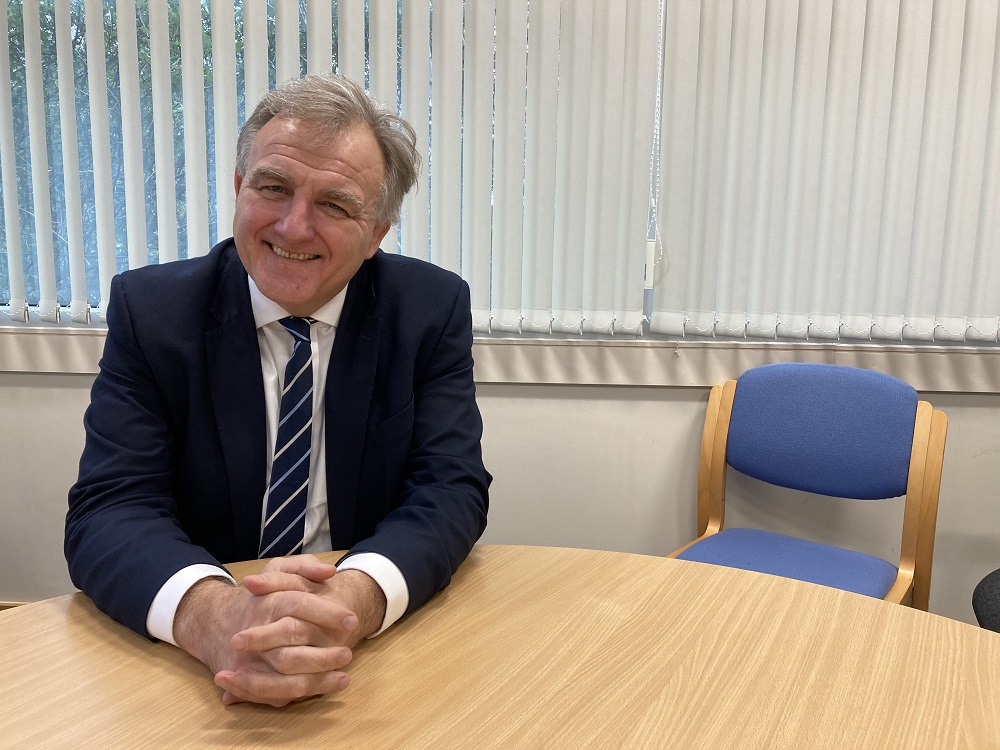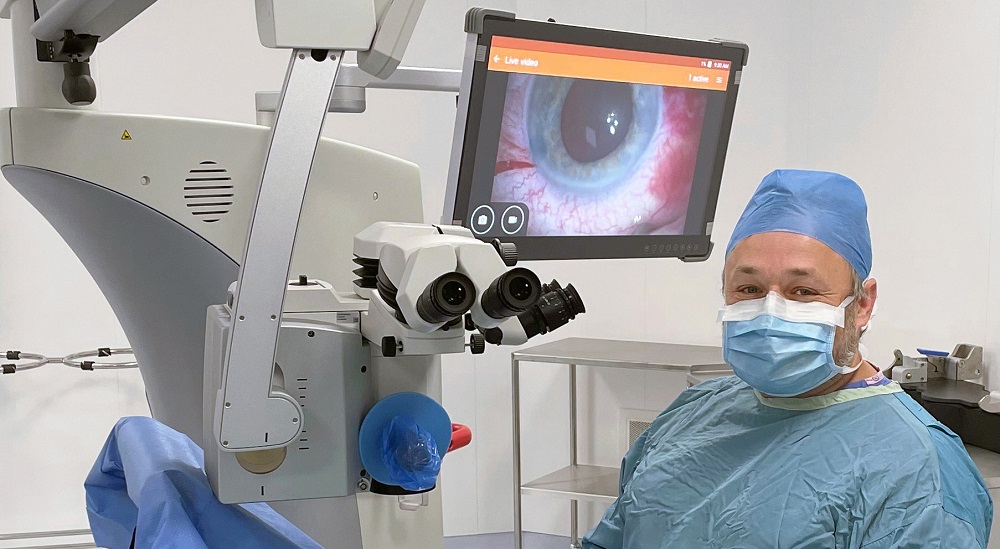Public should ‘take responsibility’ for lifting pressure on NHS health board by living healthy lifestyle says chief exec

Richard Youle, local democracy reporter
People can help an under-pressure NHS by eating nutritious food, exercising regularly and moderating their alcohol intake, the chief executive of Swansea Bay University Health Board has said.
Mark Hackett said he sought to appeal to common sense and not lecture by recommending that people choose a healthy lifestyle.
He added: “I think long term we need to fundamentally change our attitudes to fast food and sugary drinks. We know these are not right for us for our longer-term health.”
Speaking to the Local Democracy Reporting Service, Mr Hackett said the NHS was still dealing with the effects of the Covid pandemic – for example having to test and isolate positive cases in hospital – and faced a backlog of demand for treatment in areas like orthopaedics, plus more advanced and complex illnesses due to patients holding back from presenting themselves during Covid.
On top of this, he said, was an exhausted workforce which had responded “magnificently” to the once-in-a-century events of March 2020 onwards. “Some of them are incredibly traumatised by it,” he said. “We still have high levels of sickness.”
The workforce, he said, was the greatest challenge the heath board faced. Such issues are not unique to Swansea Bay, and for Mr Hackett the question was how to rejuvenate hospital and community services after a period of “catastrophic change”.
The health board is embarking on a major project to create centres of excellence at Morriston, Singleton and Neath Port Talbot hospitals to give them a specific focus. New surgical theatres have been commissioned, hundreds of nurses are being recruited – although the turnover rate is high – and money invested in community and digital services.
Morriston Hospital – the only hospital in the health board to have an accident and emergency department – will focus on complex medical and surgical treatment where patients need critical care support. Mr Hackett said £4 million has been invested to redesign acute medical services there. The problem historically at Morriston has been competing demands of emergency and planned care, with the latter losing out.
Neath Port Talbot Hospital, backed by a £25 million investment, will be a centre for orthopaedic proceedures, rehabilitation and musculo-skeletal care, while Singleton Hospital will focus on maternity, neo-natal, cancer and planned care with £14 million heading its way in 2022-23.
New operating theatres are being acquired for the two sites, and £10 million of cancer equipment was purchased last year for Singleton, with plans to add specialist “positron emission tomography” scanning next year to better diagnose and treat complex cancer cases.
The centres of excellence model, said Mr Hackett, should result in a more reliable and accessible experience for patients but will take 10 years to fully deliver.
He said current waiting times for cancer patients to receive their first treatment were “unacceptable”.
“The causes are multi-factorial,” he said. “We are seeing a substantial number of sicker and more complex patients after Covid, and more colorectal and upper gastrointestinal cancer cases.” There was a large backlog in endoscopy diagnosis, he said, but “we have started to turn the tide”.
He added: “We need fundamentally more operating facilities and faster diagnosis.”
‘Frustrating’
Mark Hackett said people needing orthopaedic surgery would be dealt with quicker then currently. “For far too long the health board has not invested enough, resulting in very long waiting lists,” he said.
The health board is receiving an extra £21 million per year from the Welsh Government to tackled planned care backlogs, and is investing other Welsh Government funding plus its own savings into the new centres of excellence model.
“We are now delivering more activity in most specialty areas than in (pre-Covid) 2019-20,” said Mr Hackett.
There was also a push for more minor care to take place at primary care settings such as GP surgeries and opticians, while some patients can be looked after at home by multi-disciplinary teams from “virtual wards” – a scheme Mr Hackett described as “outstandingly successful”.
In October this year, Swansea Bay’s three hospitals had 306 “clinically optimised” patients still occupying a bed. Around half of these were ready to be discharged but didn’t have onward care lined up. Mr Hackett said the solution must be based around councils, which are responsible for social care, and the health board’s own community services.
“It is frustrating,” he said. “I think the public needs to understand it’s not a simple problem – if it was we would have fixed it.”
The causes, he said, included staff moving to other types of jobs and a general trend of people “increasingly less inclined to look after family members”.
Asked if he felt a perception among some people that it was too difficult to see a GP or dentist was correct, Mr Hackett replied: “It’s not true to say there are restrictions in GPs’ ability to see patients.
“Our GPs are seeing record numbers of patients – sometimes 20-30% more than prior to Covid. But the demand from the public is much greater.”
He said Swansea Bay was better placed than some areas of Wales in being able to recruit family doctors.
He added: “We need to look at accessing other health professionals – pharmacists, physiotherapists and mental health practitioners.”

‘Logic’
With winter care pressures building, long ambulance handover times frequently making headlines in the UK, industrial action planned and hospital energy bills soaring, the challenges for the NHS seem to come thick and fast.
Mr Hackett said the public could do its part. “The most important things people can do is to eat well and healthily, take exercise and choose wisely the services they need to access,” he said.
“People need to take responsibility for their health and well-being. I don’t want to lecture people about their health. All I can do is appeal to common sense and logic.
“For centuries people have taken responsibility. In Western society there are ways you can prevent the onset of disease, particularly obesity. These things are in people’s control.”
He said the high prevalence in the Swansea Bay area of obesity and type 2 diabetes, which can be caused by unhealthy lifestyles, was a concern.
“I appreciate that some of these choices are difficult for people,” said Mr Hackett. “What we are looking for is how we can encourage, support and motivate people to take responsibility – what you do today impacts you tomorrow.”
Mr Hackett headed health trusts in England and ran a health consultancy before starting his current role in January 2021. His reports at health board meetings are longer and more detailed than his predecessor’s. Quality and excellence seem to be his mantra.
He explained what this meant in practice. “Is this service good enough for my mum and my family?” he said. “Are the people who see, diagnose or treat me kind and caring? Do I feel I’m the most important person they’ve dealt with today? Do they enable me to have some choices, and are these choices based on the most up-to-date evidence? Are they able to deliver that (treatment), and is it prompt and accessible for me?”
Support our Nation today
For the price of a cup of coffee a month you can help us create an independent, not-for-profit, national news service for the people of Wales, by the people of Wales.







Patronising start, modern business fuels health problems with carb rich nutrient poor foods, marketing geared to encourage alcohol comsumption , as if the majority of health problems people encounter in their life are of their own making, tell that to a T1 diabetic or Rheumatoid athritis sufferer. Where did they find this guy? Seems to be toeing Welsh labour party lines with centralising services and look to the North and see how well that went with vascular services. Time to scrap the board model which is causing some much inequity through Wales and revert to trusts again. just as back… Read more »
Fair point. Fair question back for Mr Hackett. What is your wage, including bonuses, benefits, pensions and parachute payments in the event of failure? If you want us to lead healthier lives (like we’re all choosing to be deliberately unhealthy) to help you do your job and bask in success … what are you going to do? I think drawing a sensible wage rather than live like a decadent aristocratic conspicuous consumer would be a fine legacy, in order to keep the trust you work for in good order.
Alas poverty, which sadly is still a major problem in many parts of Wales, means many people in Wales dont have the option of ‘choosing’ a healthy lifestyle.
People in Swansea Bay should ease pressures on the Health Board by becoming as well off as those in the South East.
Sounds like a far right wingnut to me.